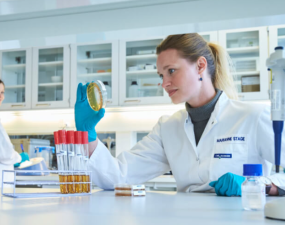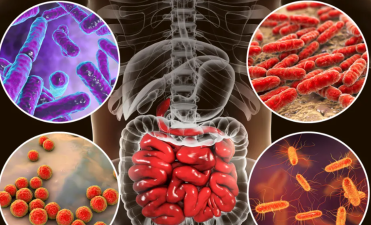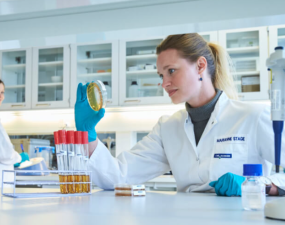From birth, microbes begin colonizing the human intestine. Microbes are present in the food and air we come into contact with daily, as well as in our skin, mouth, intestines, and other areas.
The human body's normal bacterial flora contains over 1,000 species, making it a microbial superorganism. The human microbiome and the human genome form a superorganism that together contribute to normal human function.
The Close Connection Between Microbiome and Health
- Gut Microbes and Digestion
The intestine is a crucial habitat for microorganisms. The microbes there play a crucial role in food digestion and nutrient absorption. They help break down large molecules like complex carbohydrates and proteins, converting them into small, digestible nutrients.
For example, some intestinal bacteria produce specific enzymes that break down dietary fiber. While this dietary fiber is normally difficult for the human body to digest, microbes release beneficial substances such as short-chain fatty acids, which provide energy for intestinal cells and regulate intestinal physiological functions.
Intestinal microbes also maintain the normal structure and barrier function of the intestine. They adhere tightly to the surface of the intestinal mucosa, forming a biofilm that blocks the invasion of harmful pathogens. An imbalance in the intestinal microbiome, commonly known as dysbiosis, can lead to digestive disorders, including diarrhea, constipation, and bloating.
- Immune System Regulation
The microbiome has a profound impact on the development and regulation of our immune system. From birth, we are exposed to a variety of microorganisms that gradually shape our immune system. Early exposure to microorganisms helps the immune system learn to distinguish between self and foreign pathogens, thereby better facilitating immune defenses.
Research has found that a healthy intestinal microbiome stimulates the production of an appropriate number of immune cells, such as T cells and B cells, in the intestinal immune system. These cells recognize and eliminate invading pathogens while also regulating the intensity of the immune response to prevent damage caused by excessive immune responses.
Conversely, if the microbiome is compromised, the immune system may become abnormal. For example, a decrease in certain intestinal bacteria can lead to an overactive immune system, triggering autoimmune diseases such as inflammatory bowel disease and rheumatoid arthritis.
- Metabolic Impact
The microbiome also participates in the body's metabolic processes. It can influence physiological parameters such as weight, blood sugar, and blood lipids. On the one hand, intestinal microbes can influence the body's absorption and metabolism of fat. Some studies have shown that certain intestinal bacteria can regulate the intestinal uptake and utilization of fat, as well as the synthesis and breakdown of fat in the liver. An unhealthy intestinal microbiome can lead to abnormal fat metabolism, increasing the risk of obesity and hyperlipidemia.
On the other hand, the microbiome is also linked to blood sugar regulation. Intestinal microbes can influence insulin secretion and blood sugar homeostasis by interacting with intestinal endocrine cells. Some intestinal bacteria ferment dietary fiber to produce short-chain fatty acids, which act on intestinal endocrine cells to promote insulin secretion, thereby helping to maintain normal blood sugar levels.
Normal microbiota has many important physiological functions:
- Antagonism between microorganisms. Normal microbiota adhere to, colonize, and multiply in specific locations on the human body, forming a biofilm barrier. Through antagonism, they inhibit and repel the invasion and colonization of transient microbes, thereby regulating the balance between the human body and microbes.
- Immune function. Normal microbiota can stimulate the host's immune and clearance functions. 3. Nutritional effects: Normal intestinal microorganisms such as Bifidobacterium, Lactobacillus, and Escherichia coli synthesize a variety of vitamins essential for human growth and development, such as B vitamins and vitamin K, and participate in carbohydrate and protein metabolism.
- Detoxification: Bifidobacteria can reduce the number of excessive Gram-negative bacteria in the intestine to normal levels, reducing the absorption of endotoxins.
- Anti-tumor effects: They can degrade and eliminate carcinogenic factors in the body and activate anti-tumor cytokines.
- Anti-aging effects: Bifidobacteria can stimulate the production of immunoglobulins in the intestine and promptly eliminate free radicals in the body, producing SOD (superoxide dismutase).
The dynamic balance between humans and microorganisms is called microecological balance. Factors influencing this microecological balance include both the external environment and the host. The external environment primarily alters the physiological functions of the host. For example, normal flora maintain their stability by producing bacteriocins, antibiotics, and their metabolites, and by competing for nutrients and space to prevent the invasion of transient bacteria. When the ecosystem is in balance, the host's normal physiological functions can be maintained, such as nutrition, immunity, and digestion. Dysbiosis can be caused by chronic diseases, cancer, surgery, radiation infection, and irrational use of antibiotics.






